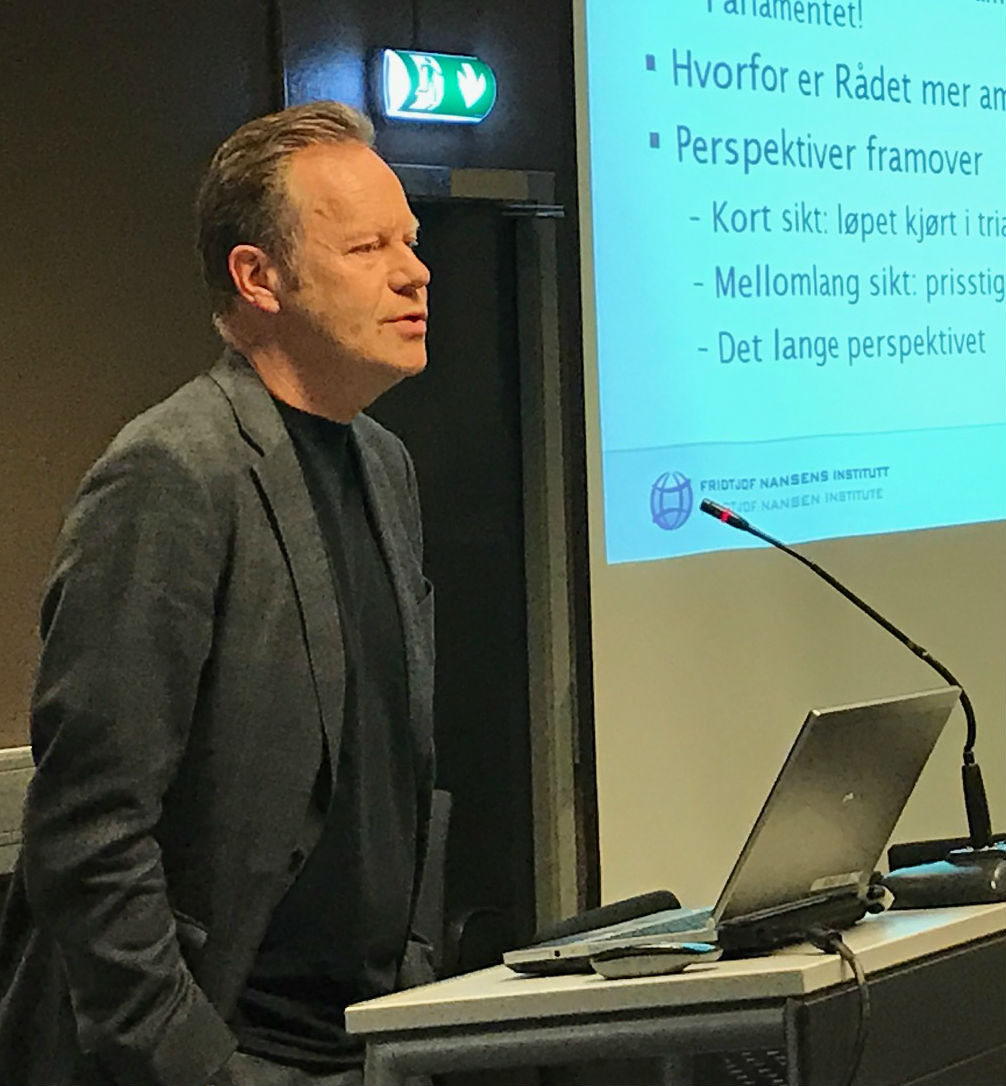Does Norway need a climate law?

With the Norwegian Parliament putting the final touches on the government’s proposed climate law, important questions arise: Do we even need this climate law? And how well will it work together with the EU Emissions Trading Scheme?
These were key questions raised when the Fridtjof Nansen Institute (FNI), Energy Norway and the Oslo Centre for Research on Environmentally-friendly Energy (CREE) recently hosted a breakfast seminar on ‘the Norwegian climate law and the revision of the EU ETS – will they work together to create green growth?’.
‘The answer is no’
 FNI Research Professor Jørgen Wettestad opened with a brief survey of the reform processes underway in the EU’s much-troubled Emissions Trading Scheme (EU ETS). Advisor Knut Kroepelien from Energy Norway followed up with a presentation of the key elements in Norway’s proposed climate law. Next, Senior Researcher Taran Fæhn from Statistics Norway and CREE posed some important questions: How will these policy instruments work together? And do we really need a climate law in Norway, since we already have the EU ETS?
FNI Research Professor Jørgen Wettestad opened with a brief survey of the reform processes underway in the EU’s much-troubled Emissions Trading Scheme (EU ETS). Advisor Knut Kroepelien from Energy Norway followed up with a presentation of the key elements in Norway’s proposed climate law. Next, Senior Researcher Taran Fæhn from Statistics Norway and CREE posed some important questions: How will these policy instruments work together? And do we really need a climate law in Norway, since we already have the EU ETS?
My short and simple answer to the second question is no, we don’t’, Fæhn went on to say. ‘The proposed climate law is not likely to produce stricter climate policies or a more rapid shift to a low-carbon economy in Norway. The law is simply too flexible for that, and there are no specific targets for Norwegian emissions cuts. For businesses and industry in Norway, what happens in the EU as regards climate policies will be much more important than this bill.’
Greater transparency
 However, Fæhn noted that the Norwegian climate law might still serve an important purpose – even if it fails to bring stricter climate policies or short-term emissions cuts:
However, Fæhn noted that the Norwegian climate law might still serve an important purpose – even if it fails to bring stricter climate policies or short-term emissions cuts:
‘The climate law is likely to contribute to a much more transparent and better-informed debate on whether we are making progress in key climate change areas. Annual assessments of emissions status, carbon budgets and the climate effects of various state budget proposals are all highly positive elements in the proposed law.’
Brussels more important
After Fæhn and other keynote speakers, there was a panel discussion on the importance and relevance of the Norwegian climate law in relation to the EU ETS. The panel, which consisted of political advisors and various NGO representatives, was clearly divided on this issue.
‘The most important thing happening in Norwegian climate policies right now is the adoption of a climate law’, stated Ragnhild Elisabeth Waagaard, senior advisor at WWF Norway.
'No, the most important thing is the change now underway in the EU ETS’, countered Ole Løfnes, head of climate and environmental issues at the Federation of Norwegian Industries (Norsk Industri). ‘The climate law, I’m afraid, is not a major focus for us.’
 EU ETS not delivering
EU ETS not delivering
Waagard voiced concern that Løfnes, industry and the Norwegian government all seem to be focusing too much on what happens in the EU, and not the policy changes needed here ‘at home’:
‘The EU ETS as it is working today is not delivering any emission cuts in Norway. We shouldn’t rely too heavily on the EU in our climate policies’, Waagard maintained.
The discussion panel, headed by journalist and columnist Kjetil Alstadheim of the Norwegian business daily Dagens Næringsliv, consisted of Anne Therese Gullberg, political advisor for the Labour Party (Ap), Audun Rødningsby, political advisor for the Liberal Party (Venstre), Peder Egseth, political advisor for the Conservative Party (Høyre) and Knut Kroepelien, senior advisor at Energy Norway, as well as the above-mentioned Ragnhild Elisabeth Waage of WWF Norway and Ole Løfnes of the Federation of Norwegian Industries.

You can review all of the keynote speakers’ presentations (in Norwegian) as well as the complete programme of the 16 May breakfast seminar by clicking on the links in the right-hand column of this page.
